Academic Research Service
Halal Science Center Chulalongkorn University Focuses on development and research of innovation beginning from the development of animal fat types analysis technique which received its research budget from Budget Bureau in 2000, and many more private and government organizations
Why conducting Halal Science research?
- To analyse the complication of ingredients and food production process
- To protect Muslim and non-Muslim consumers
- To add value to Halal products of Thailand
- To use Halal Science as a tool for development in human resource, social science and economics, and science and technology
- To create the Halal Science innovation to earn both national and international academic acceptance
What types of research have been conducted by the Halal Science Center?
Food Adulteration based on Islamic Law
- Testing Development
* DNA analysis: Multiplex real-time PCR, DNA sequencing; PGM)
* Chemical analysis: 1) Gelatin; LC-MS/MS, 2) Phospholipid; LC-QTOF - Renewable ingredient development for food and medicinal purposes e.g., bioactive compounds locally found in the three southern provinces of Thailand and plants and herbs found in Islamic Literature
Non-food Testing development
- Cosmetics * Development in Halal cosmetic products
- Halal Innovation Products using Nanotechnology
What have we achieved from Halal Science Research?
H-Numbers
Halal ingredient reference is a reference book to facilitate industrial sectors in selecting Halal ingredients for their food production based on Islamic Law.
The H Numbers is a database for the analysis of Halal raw materials and chemicals. Compliance with Halal standards entails ensuring that the end product is devoid of any components that are prohibited by Islamic legal requirements. While the control system for raw materials or food additives typically incorporates E-Number verification as part of its general food safety measures, the Halal industry necessitates a comprehensive assessment of raw materials to ensure they align with both Halal and safety (Halal and Toyyib) standards.
The HSC has recognized the importance of addressing these challenges and has seized the opportunity to develop the ‘H numbers,’ a cutting-edge and precise system designed to search for halal food additives, with a focus on the future of the food industry. This system compiled a database containing 323 frequently utilized food additives in Thailand’s food sector, aiming to establish a comprehensive repository of halal food additives. Among these entries, 129 food additives had received certification from reputable foreign Halal organizations, while 43 lacked such endorsements. HAFOLAB meticulously verified a total of 151 items, confirming their inherently halal nature through the esteemed committee of Sheikhul Islam’s Majlis Ulama of Thailand. The H-number system has had a profound impact on the food industry, delivering tangible benefits to 473 food companies through its innovative platform. Its remarkable influence was duly recognized with the prestigious Public Sector Excellence (Lert-Rat) Award for Outstanding Public Service Innovation in 2020. Buoyed by this success, the H-number system is now expanding its scope to the cosmetic industry, incorporating an additional 481 chemicals in the current year (Figure 3).
Figure 3: The growth in the number of food additives and chemicals used in food and cosmetic manufacturing (in red) along with the number of manufacturers utilizing the H-number system (blue) from 2015 to 2023.
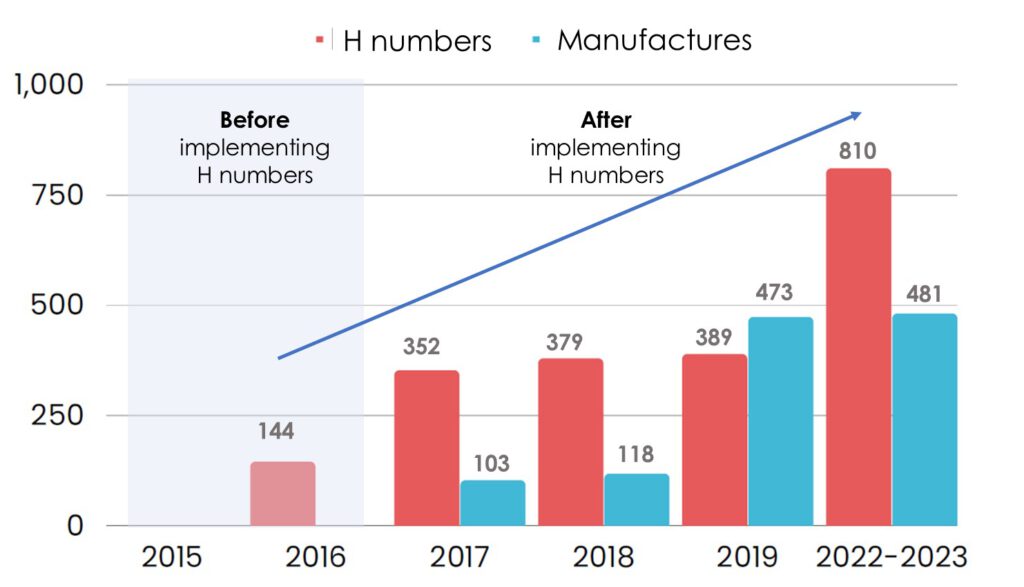
ANADA SUNSCREEN CREAM
This natural sunscreen made from natural white clay (Kaolin) and black cumin seed oil is a product developed by the Halal Science Center, Chulalongkorn University. Kaolin in this sunscreen helps protect your skin from UVA & UVB, and black cumin seed oil has an antimicrobials effect. Anada Sunscreen cream has a pH value of 7.5 – 8.5 with an SPF of 30. It is not sticky and easily absorbed. Apply to your face, neck, and body 15 minutes before sun exposure. Re-apply every 2-3 hours. Dermatologist tested.
ANTI-ACNE CREAM
This anti-acne cream is composed of kaolin, bentonite, and black seed oil. Habbatus sauda or black seed extract has a property to inhibit the growth of P.acnes, one of the microbes which mainly cause acne. Anada anti-acne cream has a pH value of 4.5 – 7.5; It is easily absorbed and not sticky to your skin.
NAJIS CLEANSING CLAY
This fragrance-free of the pH value of 5.5-6.5 najis cleansing clay liquid, of which the main ingredient is natural white clay (Hydrated aluminium silicate) is developed by the Halal Science Center, Chulalongkorn University and religious verdict by Sheikul Islamic’s Majlis Ulama of Thailand (Fatwa) for najis cleansing. This najis cleansing clay is also good for household cleansing in general as well as hand wash.
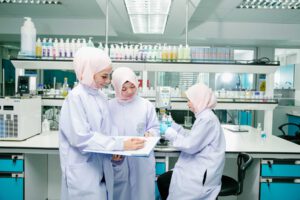
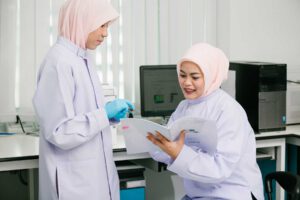
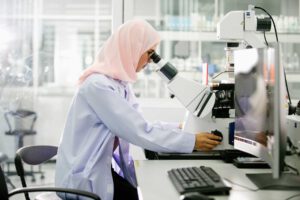
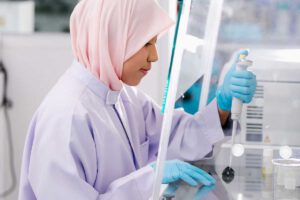
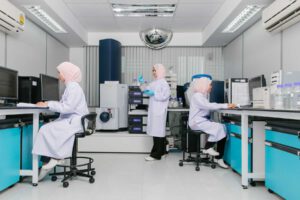
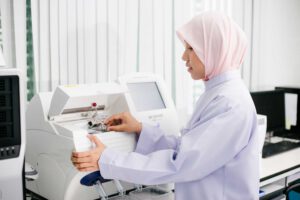
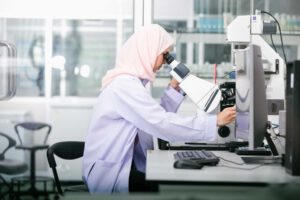
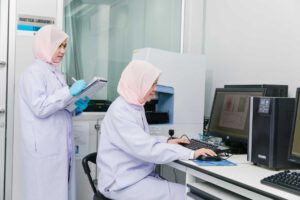
Dr.Surin Pitsuwan
Research and Innovation Laboratory
While serving as the Minister of Foreign Affairs of the Kingdom of Thailand in 1999, H.E. Tan Sri Dr. Surin Pitsuwan kindly wrote the commendation in the book Halal-HACCP. Indeed, it was this commendation which inspired the author to go on to establish the Halal Science Center, Chulalongkorn University.
Later, before taking up the post of ASEAN Secretary-General in 2008, H.E. Tan Sri Dr. Surin Pitsuwan kindly presided over the 1st Halal Science, Industry, and Business Conference (HASIB) organized by the Halal Science Center. He once defined the term HASIB as one of the 99 Names of Allah (Subhanahu Wa Ta’ala), meaning ‘The Reckoner.’ Following on from this, he compared Halal Science as two streams of knowledge converging, as stated in the Al Quran, Surah Al-Kahf 18:60. This analogy left a lasting impression on every member of the Halal Science Center.

For many years, the Halal Science Center, Chulalongkorn University has continuously cohosted the Halal Science, Industry, and Business Conference (HASIB) with the Central Islamic Council of Thailand. More recently, the HASIB Conference has been promoted as the Thailand Halal Assembly (THA). As a member of the Halal Science Center Executive Board of Committee, which the President of Chulalongkorn University chairs, H.E. Tan Sri Dr. Surin Pitsuwan kindly delivered the keynote speeches at every THA Conference. These speeches always offered both valued and visionary insights into research and innovations within Halal Science.
At 13.30 on the 30th of November, 2017, while preparing to leave his residence to preside over the 4th THA (the 10th HASIB) Conference as the representative of the Prime Minister of Thailand, H.E. Tan Sri Dr.Surin Pitsuwan suddenly had a heart attack and passed away peacefully. As the Al Quran states: “Indeed we belong to Allah, and to Him we shall return.”
To commemorate H.E. Tan Sri Dr. Surin Pitsuwan and his valuable contributions to society and to the Halal Science Center, Chulalongkorn University’s Halal Science Center Executive Board of Committee has unanimously agreed to name a Halal Science Center laboratory ‘Tan Sri Dr. Surin Pitsuwan Halal Science Research and Innovation Laboratory.’
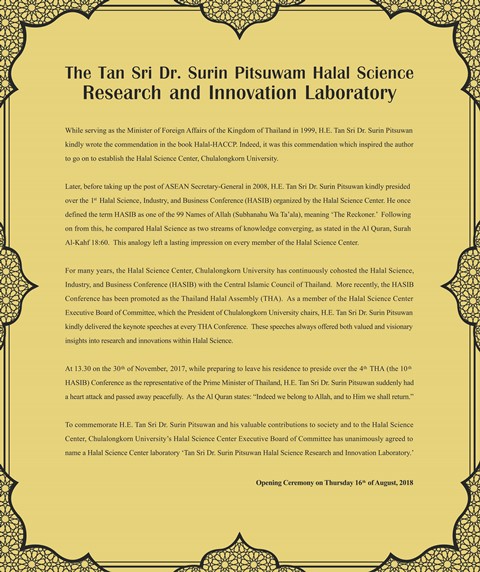
1. Nutrition Biochemistry Laboratory
Liquid Chromatography–Mass Spectrometry with Quadrupole time-of-flight analyser (LC-MS/Q-TOF)
can be used to analyse sample at very low quantity. The Q-TOF mass spectrometry (MS) uses the technique of separating all ions from each other based on the mass-to-charge ratio (m/z) of different types of ions. Separated ion is then conveyed to detector to measure the quantity. The data is calculated and displayed in form of mass spectrum which is the graph showing the amount of ion per its mass-to-charge ratio (m/z) of each type.
This method is popularly used in food sample and chemical sample to determine the type of protein, qualitative polypeptide analysis, medical indicator of disease, pharmacological analysis of drugs, etc.
2. Nano Technology and Cosmetics Laboratory
is a science and innovation laboratory which specialized and divided in to two areas. The first is, nanotechnology area where nanoparticles are analysed and researched on with advanced tools which are:
Scanning Electron Microscopy (SEM) is a type of electron microscope that produces images of a sample by scanning the surface with a focused beam of electrons.
Atomic Force Microscopy (AFM) is a very-high-resolution type of microscope using atomic force to analyse the surface of sample and substance diffusion etc.
Finally, Confocal laser scanning microscope is an optical imaging technique for increasing optical resolution and contrast of a micrograph resulting in 3-dimension image that is more precise and often uses to analyse the sample at genetic, cell or micro level.
The second area of the research lab is the cosmetics area where development and research of halal products are taken place. The installed Cutometer can analyse moisture content, elasticity and skin’s strength of the product. Also, the lab is equipped with advanced and dependable tools for use in cosmetics production for the development of innovative nanotechnology and global improvement.
3. Molecular Biology Research Laboratory
Liquid Ion Torrent Personal Genome Machine (PGM) is Next Generation Sequencing; NGS
that can detect the genome of any organism enabling the identification of every animal specie found in food sample at the same time. This is an advanced molecular biology technique which is also used in pharmacology and medical diagnosis.
Digital Droplet PCR is the method that can be used to directly quantify and clonally amplify nucleic acids strands (DNA) by polymerase chain reaction. The method can be used to detect contamination of animal’s DNA with absolute accuracy without the help of standard solution in comparison, in which help reduce cost and make harom detection in halal food much more accurate.
In addition, cell and bacterial cell culture research are conducted to analyse new innovative halal products from nanotechnology and cosmetics research.
Samples of Academic Services and Research of the Center
Clay Soap development
for cleansing of Nayis (Dirty things according to Islamic commandments)
Collagen Separation and Analysis
Obtained from various animals using LC / MS / MS
Cosmetic product development
that is free from contamination, prohibited by Islamic commandments.
Development of mass and charges
analysis techniques for animal protein separation
Development of Multiplex Real-Time PCR
DNA detection of Islamic prohibited animals that may contaminate in food, cosmetic and medical products.
Comparative study on animal’s
stress and pain signal when slaughtered with different techniques, HPLC, PCR and Real-Time PCR.
Development of healthy snack products
from herbs according to the Islamic teachings to strengthen Muslim health and exports.
Development of contamination detector reagent
according to Islamic principles with immunological techniques.
Study of active ingredients
In Black Cumin’s seed
Metal quantity analysis
with ICP
Study of the effect of active ingredient
In Black Cumin’s seed to reduce blood sugar levels
Determination of antibiotic content (Amoxicillin)
In animal food using HPLC
Study of the properties of active extracts
from Black Cumin’s seed of its effect on gene in cancer cells.
